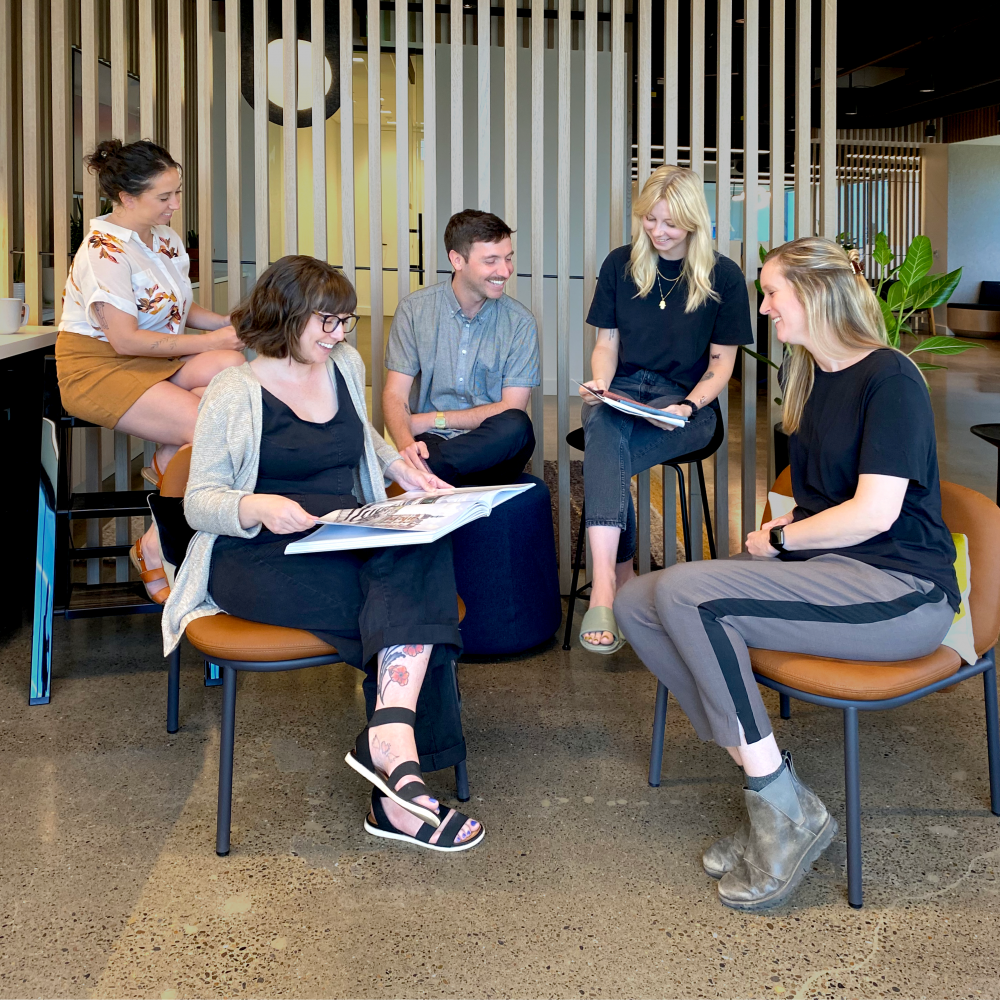Meet the DESIGN+BUILD Workspace team and their winning ‘CONNECT, A Universal Co-Create Space’ submission in the Furniture and DEI categories. You can keep up with what’s next for DESIGN+BUILD Workspace by following them on LinkedIn or Instagram. Check out the full submission below!

Ashleigh Lessard, Furniture Design Manager, Allied ASID
Caitlin Cunningham, Workplace Strategist
Samantha Aleo, Interior Designer, NCIDQ, LEED Green Assoc.
Maddy Mackin Freeman, Design Director
Sara Donovan, Interior Designer
Erik Larson, Architectural Project Lead
We connected with the DESIGN+BUILD Workspace team to see how their submission has evolved since entering the competition.
“As a team, we continue to see how an agile workstyle is not only becoming the norm, but is a necessity for many workers in the city of Portland. Being workplace designers by trade, our ongoing research and development reinforces our passion in providing innovative, inclusive solutions to contemporary work-life obstacles. We are all active community members, and recognize how a CONNECT space can uplift and support the diverse culture we live in.
After the enriching brainstorming session that lead to the CONNECT approach, our team has discussed the possibility of fabricating a prototype. Being a design-build firm, we have the opportunity to manifest this concept into a tangible, usable archetype that could be presented to both private and public entities around the city of Portland.”
Check out the slideshow and summary of the submission below:
CONNECT, A Universal Co-Create Space
The working world as we know it was turned on its head in 2020 when the Covid pandemic forced many workers to work remotely. Suddenly gone were the days of commuting more than an hour each way to sit in an enclosed stuffy office space. For the last two years, employees have seen the benefits of working away from their primary office space and choosing where and how they want to work while meeting their work needs.
This has provided much more flexibility but has also come with tradeoffs. Two of the biggest challenges for employees working hybrid have been long commutes and childcare. Commute was sited number one reason of why workers prefer to work from home. On average, those who work from home save 54 minutes per day by removing their commute, plus an additional 9 minutes otherwise spent getting ready for an in-office workday.
For many parents, childcare has been cited as one of the major challenges with returning to work. The Pew Research Center conducted a survey in 2020 of United States adults where nearly half of employed parents with children under 12 expressed difficulties with juggling childcare and work responsibilities during the pandemic.
How can lessons learned from the pandemic create a workspace that provides for workers, while also meeting the needs of employers?
Studies show access to a space away from both the home and the office – a mobile, coworking space – could make a huge impact on the lives of commuters. According to the 2021 Gensler Research Institute’s Global Workplace Survey, the rise of the “third space” is an important part of the new workplace ecosystem. The third place provides the same refuge and services as home or the office. A new, distributed workforce ecosystem arises which gives individuals the ability to work from any location they can in order to do their best work.
Daily connection to nature and the outdoors improves happiness, well-being, and increased positive social interactions, however there are limited options for outdoor workspaces throughout our cities and places of work.
CONNECT workstations are an innovative solution to the changing times, spurred from agile work strategies. A modular desking system with endless configurations, CONNECT partners with local parks and communities to give users a third place to work that has synergy with nature, while allowing balance with childcare and the demands of modern work culture. Composed of lightweight, modular furniture pieces, five simple structures are made to work in congruence with one another to meet the user’s preferred workstyle.
Designed with accessibility, usability, and materiality in mind, the goal of a CONNECT installation is to link neighborhoods and communities burdened by long commutes to green locations close to home, within reach of varied socioeconomic backgrounds. CONNECT third spaces allow users to create a personalized setup that provides for a variety of different work and collaboration styles, and offers an alternate outlet for the working family and beyond. The ultimate biophilic workplace, the CONNECT system improves wellbeing for all.
Here’s what our jurors had to say about DESIGN+BUILD Workspace’s submission:
- “Absolutely – we heard time and again equitable access to nature is needed to drive down obesity and to address mental health trauma in vulnerable communities and workers.”
- “I love the concept of an ecosystem of support around third places.”
- “Probably the most thoroughly thought out and comprehensive approach.”
- “I love this one. I don’t think I’ve seen something like this before. Something explicitly designed to be in the addressed settings.”






